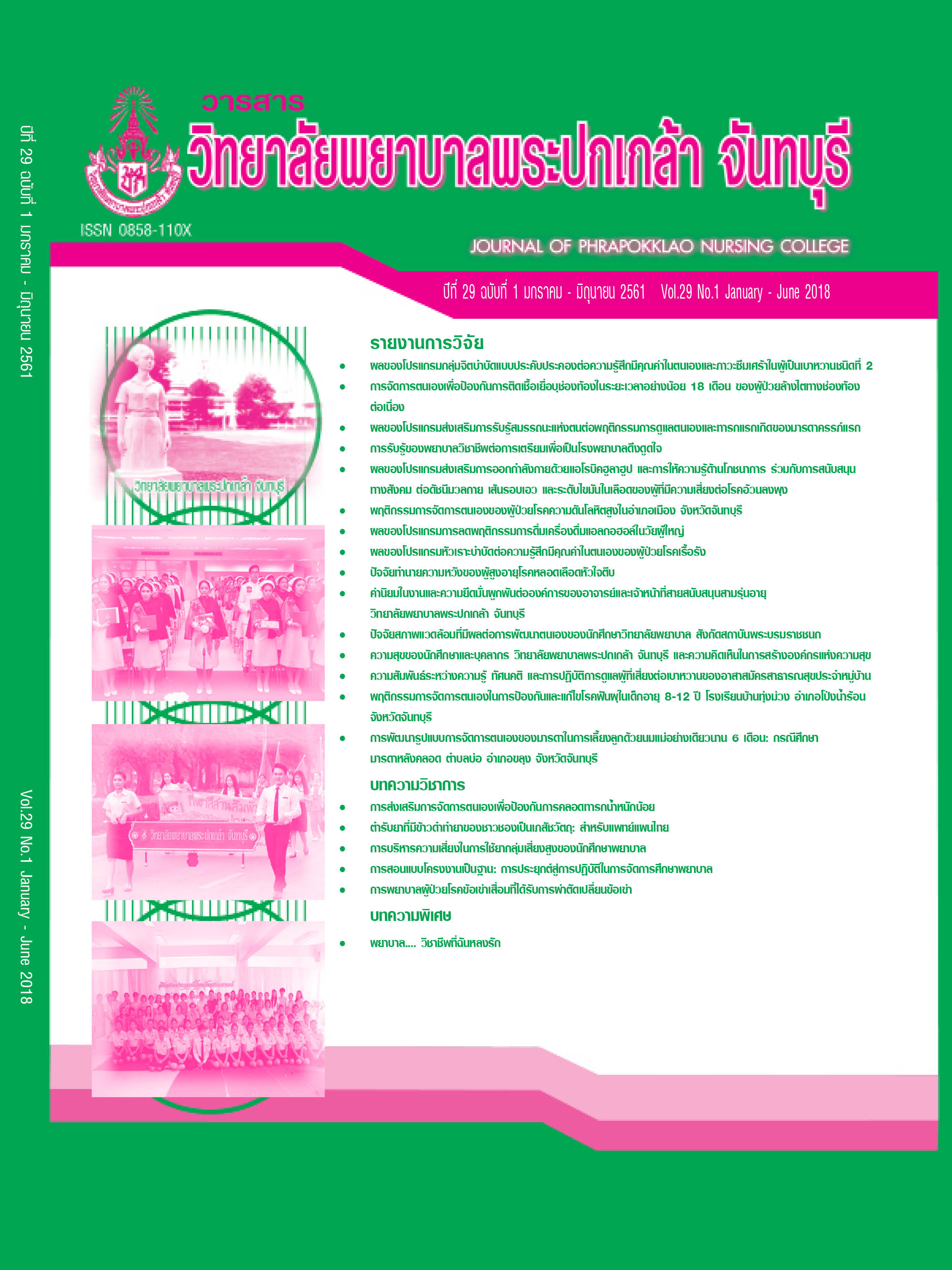The Effects of a Self-efficacy Promoting Program on Self-care Behaviors and Newborn Care Behaviors of First-time Mothers
Keywords:
A self-efficacy promoting program, Postpartum self-care behaviors, Newborn care behaviorsAbstract
This quasi-experimental research aimed at exploring the effects of a self-efficacy promoting program on self-care behaviors and newborn care behaviors of first-time mothers. The samples consisted of 50 first-time mothers who received antenatal services, gave birth, and sought infant’s health follow-up at Prapokklao Hospital, Chanthaburi Province. They were equally divided into an experimental group (n = 25) and a control group (n = 25). The research instruments were composed of a self-efficacy promoting program, a questionnaire of demographic data, a questionnaire of self-care behaviors of mothers with the reliability of .80, and a questionnaire of newborn care behaviors of mothers with the reliability of .70. The implementation and data collection were conducted from April to August, 2017. Statistics used for data analysis included frequency, percentage, mean, standard deviation, Chi-square test, and independent t-test.
The research results revealed that the first-time mothers in an experimental group had statistically significant better overall mean scores of self-care behaviors and newborn care behaviors than those in a control group (t = 5.010, p < .001 and t = 1.811, p < .05, respectively).
This research suggested that this self-efficacy promoting program should be applied to first-time mother caring activities. Additionally, this program should be introduced to nursing students.
References
กมลวรรณ นำรอดภัย. (2551). ผลของโปรแกรมการจัดการกับความเหนื่อยล้าต่อระดับความเหนื่อยล้าในมารดาหลังคลอดครรภ์แรกที่คลอดบุตรทางช่องคลอด (วิทยานิพนธ์ปริญญามหาบัณฑิต). กรุงเทพฯ: มหาวิทยาลัยมหิดล.
กมลวรรณ ลีนะธรรม, และธนิดา จุลย์วนิชพงษ์. (2557). ผลของโปรแกรมการให้ความรู้และแรงสนับสนุนทางสังคมต่อความเครียดของมารดาหลังคลอด. วารสารวิชาการมหาวิทยาลัยการจัดการเทคโนโลยีอีสเทิร์น, 11(1), 1-11.
จินตนา ศรีสุพพัตพงษ์. (2550). ปัจจัยที่มีผลต่อพฤติกรรมการดูแลตนเองของมารดาหลังคลอดในเขตจังหวัดราชบุรี (วิทยานิพนธ์ปริญญามหาบัณฑิต). นครปฐม: มหาวิทยาลัยศิลปากร.
ทิศนา แขมมณี. (2550). ศาสตร์การสอน: องค์ความรู้เพื่อการจัดกระบวนการเรียนรู้ที่มีประสิทธิภาพ (พิมพ์ครั้งที่ 6). กรุงเทพฯ: สำนักพิมพ์แห่งจุฬาลงกรณ์มหาวิทยาลัย.
เทวีรัตน์ ฉวีวรรณ, จันทิมา ขนบดี, และปรานี ป้องเรือ. (2552). ผลของโปรแกรมการส่งเสริมการรับรู้สมรรถนะแห่งตนต่อพฤติกรรมการดูแลตนเองของมารดาหลังคลอดครรภ์แรกที่คลอดทางช่องคลอด. วชิรสารการพยาบาล, 11(2), 34-48.
นภาพร นพพัฒนกุล. (2556). ผลของโปรแกรมการส่งเสริมบทบาทการเป็นมารดาร่วมกับการใช้โปรแกรมคอมพิวเตอร์ช่วยสอนต่อพฤติกรรมการดูแลทารกแรกเกิด (วิทยานิพนธ์ปริญญามหาบัณฑิต). กรุงเทพฯ: จุฬาลงกรณ์มหาวิทยาลัย.
นัยนา ปาระมี. (2551). ความสัมพันธ์ระหว่างปัจจัยคัดสรร การรับรู้ความสามารถของตนเอง กับพฤติกรรมการดูแลตนเองที่บ้านของมารดาวัยรุ่นในระยะหลังคลอด (วิทยานิพนธ์ปริญญามหาบัณฑิต). มหาวิทยาลัยขอนแก่น.
มัทนา สังวาลย์, และนิตยา โรจนนิรันดร์กิจ. (2558). การศึกษาเปรียบเทียบประสิทธิผลของสื่อการสอนระหว่างสื่อวีดิทัศน์กับภาพพลิก ในด้านความรู้เรื่องการปฏิบัติตัวหลังคลอดและทักษะการให้นมมารดาของสตรีหลังคลอด. วารสารพยาบาลสาธารณสุข, 29(1), 56-66.
ศิณัฐชานันท์ วงษ์อินทร์, จันทิมา ขนบดี, และจรัสศรี ธีระกุลชัย. (2554). ผลของโปรแกรมการส่งเสริมการแสดงบทบาทเป็นมารดาโดยเน้นการมีส่วนร่วมของสามีต่อการแสดงบทบาทการเป็นมารดาในมารดาวัยรุ่นครรภ์แรก. วชิรสารการพยาบาล, 13(2), 76-92.
ศิริวดี ชุ่มจิต. (2558). ความพึงพอใจต่อรูปแบบการให้ความรู้เรื่องการบริหารร่างกายของมารดาหลังคลอด โรงพยาบาลส่งเสริมสุขภาพ ศูนย์อนามัยที่ 4 ราชบุรี (รายงานผลการวิจัย). ราชบุรี: โรงพยาบาลส่งเสริมสุขภาพ ศูนย์อนามัยที่ 4.
สุหรี หนุ่งอาหลี. (2547). โปรแกรมการส่งเสริมการรับรู้ความสามารถของตนเองต่อพฤติกรรมการเลี้ยงดูบุตรของมารดาวัยรุ่นหลังคลอดครรภ์แรก (วิทยานิพนธ์ปริญญามหาบัณฑิต). กรุงเทพฯ: จุฬาลงกรณ์มหาวิทยาลัย.
อดิณา ศรีสมบูรณ์. (2554). ผลของโปรแกรมการส่งเสริมบทบาทการเป็นมารดาต่อความสำเร็จในบทบาทการเป็นมารดาของมารดาวัยรุ่นที่ไม่ได้วางแผนการตั้งครรภ์ (วิทยานิพนธ์ปริญญามหาบัณฑิต). กรุงเทพฯ: มหาวิทยาลัยมหิดล.
อัจฉโรบล แสงประเสริฐ, พรวิไล คล้ายจันทร์, และพลอยไพลิน มาสุข กำแพงจินดา. (2557). ความสัมพันธ์ระหว่างการรับรู้ความสามารถของตนเองกับพฤติกรรมการดูแลตนเองของมารดาวัยรุ่นในระยะหลังคลอด. วารสารวิทยาลัยพยาบาลบรมราชชนนี อุตรดิตถ์, 6(1), 1-11.
อาภัสรา เอี่ยมสำอางค์. (2555). ผลของโปรแกรมส่งเสริมการรับรู้สมรรถนะแห่งตนต่อความสำเร็จในการดำรงบทบาทมารดาของหญิงตั้งครรภ์วัยรุ่น (วิทยานิพนธ์ปริญญามหาบัณฑิต). ปทุมธานี: มหาวิทยาลัยธรรมศาสตร์.
เอมพร รตินธร. (2559). การดูแลต่อเนื่อง: หัวใจในการพัฒนาคุณภาพการปฏิบัติการผดุงครรภ์. กรุงเทพฯ: วัฒนาการพิมพ์.
Bandura, A. (1997). Self-efficacy: The exercise of control. New York: W.H. Freeman.
Bryanton, J., Gagnon, A. J., Hatem, M., & Johnston, C. (2008). Predictors of early parenting self-efficacy: Results of a prospective cohort study. Nursing Research, 57(4), 252-259.
Cohen, J. (1988). Statistical power analysis of the behavioral sciences (2nd ed.). Hillsdale, NJ: Lawrence Erlbaum Associates.
Carolan, M., & Hodnett, E. (2007). ‘With woman’ philosophy: Examining the evidence, answering the questions. Nursing Inquiry, 14(2), 140-152.
Deave, T., Johnson, D., & Ingram, J. (2008). Transition to parenthood: The needs of parents in pregnancy and early parenthood. BMC Pregnancy and Childbirth, 8, 30.
Entsieh, A. A., & Hallstrom, I. K. (2016). First-time parents’ prenatal needs for early parenthood preparation: A systematic review and meta-synthesis of qualitative literature. Midwifery, 39, 1-11.
Fahey, J. O., & Shenassa, E. (2013). Understanding and meeting the needs of women in the postpartum period: The perinatal maternal health promotion model. Journal of Midwifery & Women’s Health, 58(6), 613-621.
Jamalivand, S., Mirghafourvand, M., & Mohammad-Alizadeh Charandabi, S. (2017). Comparison of the effects of educational software and training booklet on maternal self-efficacy and infant care behavior in Iranian mothers: A randomized controlled trial. International Journal of Pediatrics, 5(10), 5923-5934.
Kiehl, E. M., & White, M. A. (2003). Maternal adaptation during childbearing in Norway, Sweden and the United States. Scandinavian Journal of Caring Sciences, 17(2), 96-103.
Kuo, S. C., Chen, Y. S., Lin, K. C., Lee, T. Y., & Hsu, C. H. (2009). Evaluating the effects of an internet education programme on newborn care in Taiwan. Journal of Clinical Nursing, 18(11), 1592-1601.
Leahy-Warren, P., & McCarthy, G. (2011). Maternal parental self-efficacy in the postpartum period. Midwifery, 27(6), 802-810.
Polit, D. F., & Beck, C. T. (2012). Nursing research generating and assessing evidence for nursing practice (9th ed.). Philadelphia: Lippincott, Williams & Wilkins.
Shorey, S., Chan, S. W. C., Chong, Y. S., & He, H. G. (2014). Maternal parental self-efficacy in newborn care and social support needs in Singapore: A correlational study. Journal of Clinical Nursing, 23(15-16), 2272-2283.
Downloads
Published
How to Cite
Issue
Section
License
Copyright (c) 2018 Journal of Phrapokklao Nursing College

This work is licensed under a Creative Commons Attribution-NonCommercial-NoDerivatives 4.0 International License.
เนื้อความ ข้อมูล และรายการอ้างอิงที่ผู้เขียนใช้ในการเขียนบทความเพื่อลงตีพิมพ์ในวารสารวิทยาลัยพยาบาลพระปกเกล้า จันทบุรี ถือเป็นความคิดเห็นและความรับผิดชอบของผู้เขียน คณะผู้จัดทำวารสารไม่จำเป็นต้องเห็นพ้องด้วยหรือร่วมรับผิดชอบ
บทความที่ได้รับการลงตีพิมพ์ในวารสารวิทยาลัยพยาบาลพระปกเกล้า จันทบุรี ถือเป็นลิขสิทธิ์ของวารสารวิทยาลัยพยาบาลพระปกเกล้า จันทบุรี หากหน่วยงานหรือบุคคลใดต้องการนำส่วนหนึ่งหรือทั้งหมดของบทความไปเผยแพร่ต่อเพื่อวัตถุประสงค์ใด ๆ จะต้องได้รับอนุญาตจากบรรณาธิการวารสารก่อน



